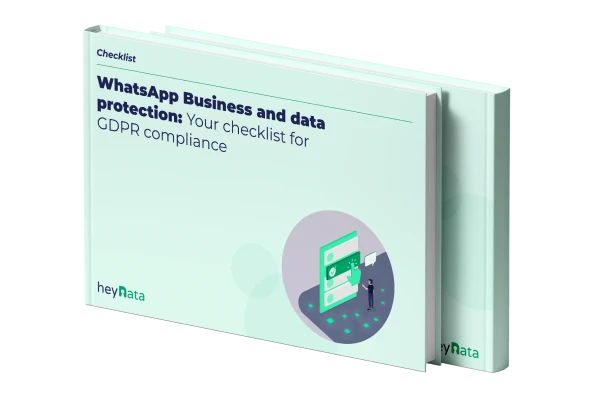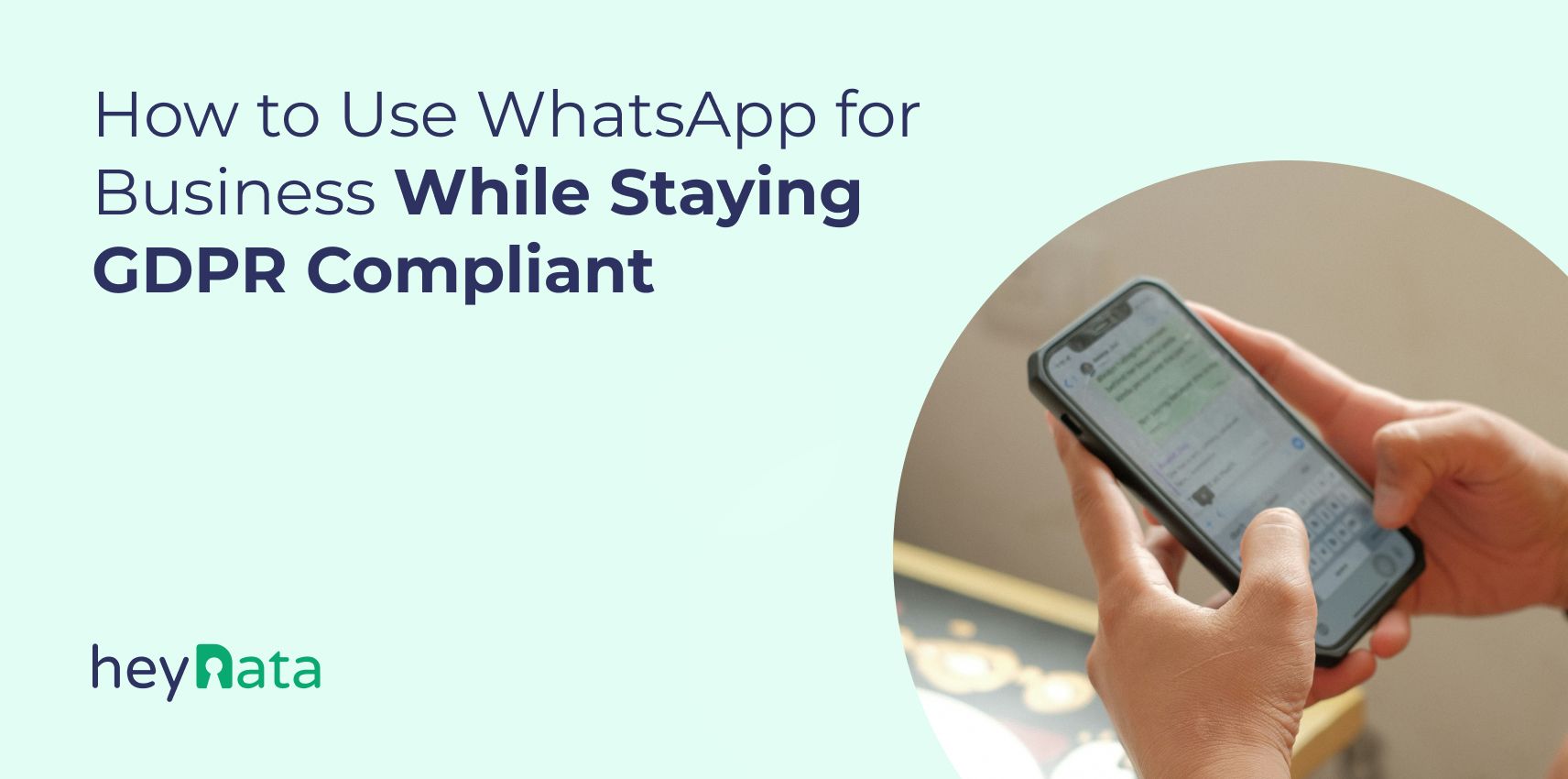
Want to use WhatsApp Business While Staying Compliant?
Communicate securely with WhatsApp Business – our 10-step checklist helps you stay GDPR-compliant.

How to Use WhatsApp for Business While Staying GDPR Compliant

'%3e%3cpath%20d='M26.6667%2020.022L30%2023.3553V26.6886H21.6667V36.6886L20%2038.3553L18.3333%2036.6886V26.6886H10V23.3553L13.3333%2020.022V8.35531H11.6667V5.02197H28.3333V8.35531H26.6667V20.022Z'%20fill='%230AA971'/%3e%3c/g%3e%3c/svg%3e) Summary
Summary
- The WhatsApp Business app is not GDPR-compliant – only the Business API offers a compliant solution.
- Metadata is not encrypted and requires explicit user consent under GDPR.
- Integration via certified EU-based BSPs is essential for legal use in customer communication.
- KLM shows best practice, using opt-in, minimization, and EU-certified partners.
Can businesses use WhatsApp and stay GDPR-compliant?
Yes, but only through the WhatsApp Business API, not the regular Business app. GDPR-compliant use requires integration with an EU-based, certified Business Solution Provider (BSP), explicit consent from users, and clear data processing agreements.
With over 2 billion users worldwide, WhatsApp is one of the most widely used messaging apps globally. In countries like India and Brazil, it dominates the market with over 90% share. Even in Germany, more than 80% of the population relies on WhatsApp for daily communication including businesses.
Given its massive reach, it’s no surprise that businesses across Europe are increasingly using WhatsApp for customer service, support, and marketing. Its ease of use and popularity help build direct, personal customer relationships. But with WhatsApp being owned by Meta, ensuring GDPR compliance is critical — to protect user data and avoid hefty EU fines.
Related Blogs: WhatsApp vs. Signal: Which Messenger Is Better for Data Protection
Table of Contents:
WhatsApp's Problematic History of Compliance
However, despite its popularity, WhatsApp has faced significant challenges concerning compliance with data protection regulations.
In 2021, WhatsApp was fined €225 million by Ireland’s Data Protection Commission — the largest fine ever issued by the Irish authority and the second-highest GDPR fine in the EU. The messaging app, owned by Meta (formerly Facebook), had violated GDPR rules around data transparency and user privacy.
The investigation into WhatsApp's compliance issues began in 2018, focusing on whether the company was transparent enough about how it handled user information. Regulators found that WhatsApp’s privacy policies lacked clarity, particularly regarding data storage and processing. This lack of transparency led to significant concerns, especially given WhatsApp's dual use for personal and professional communication. Lawyers and data protection experts often advise against using WhatsApp for business communication due to these deficiencies.
Related Blogs: Data Processing Agreements (DPAs) – heyData creates transparency
What Does GDPR Require When Using WhatsApp for Business?
To use WhatsApp in line with GDPR compliance requirements, businesses need to adhere to several key principles:
- Data Minimization: Only collect data that is necessary for the specific purpose.
- Purpose Limitation: Use data solely for the purposes explicitly stated at the time of collection.
- Consent: Obtain explicit consent from users before processing their data.
- Data Subject Rights: Ensure users can exercise their rights to access, rectify, and delete their data.
What Data Does WhatsApp Collect from Its Users?
Since 2016, WhatsApp has implemented end-to-end encryption for all chat content. This means that message content cannot be read by third parties – including Meta.
However, the unencrypted metadata remains a major issue for GDPR compliance. Metadata includes:
- Device name and type
- IP Address
- Location
- Time of day
- Profile photos, names, and descriptions
- Contacts
While metadata doesn't show the actual content of conversations, it can still build a pretty clear picture of a user's behavior. WhatsApp currently sends this data to other EU countries and shares it with its parent company Meta to help maintain and secure their service.
This applies to both the WhatsApp app and the WhatsApp Business app.
Under GDPR, processing personal (meta) data requires explicit user consent. This is usually managed through a data processing agreement (DPA), which outlines how your company and WhatsApp handle data. However, the personal WhatsApp app doesn't support DPAs. So, to use WhatsApp for business, in theory, you'd need to get consent from each customer and prospect individually.
So how can your company overcome this obstacle?

Want to use WhatsApp Business While Staying Compliant?
Communicate securely with WhatsApp Business – our 10-step checklist helps you stay GDPR-compliant.
Two Ways Businesses Can Use WhatsApp
Besides its regular app for personal use, WhatsApp provides two business options: the Whatsapp Business App and the Whatsapp Business API, also known as the Whatsapp Business Platform. While both are designed for business use, their features, capabilities, and costs differ significantly.
In short, the Business App is ideal for entrepreneurs and very small support teams, whereas the Business Platform is suitable for larger, professional sales and marketing teams.
However, despite having end-to-end encryption, the WhatsApp Business app is not GDPR compliant and should not be used for corporate communications. Four main issues may conflict with data protection laws:
- WhatsApp processes metadata relevant to GDPR, which companies cannot prevent.
- WhatsApp has access to contact data by default. This can be avoided by not allowing the app to access your contacts or by using the business app on a separate device with only business contacts.
- WhatsApp stores backups unencrypted by default. You can encrypt backups in the app settings.
- WhatsApp caches undelivered messages on its servers, which cannot be prevented.
This leaves us with the WhatsApp Business Platform, the universally recommended solution for business users. It is a paid service designed for medium to large businesses. The API allows you to send messages via WhatsApp without WhatsApp processing personal data or storing messages on its servers. Therefore, GDPR compliance depends on the company integrating the API, not on WhatsApp.
Using the WhatsApp Business API in a GDPR-compliant way
The WhatsApp Business API (also known as the WhatsApp Business Platform) enables secure communication, but it must be used with a certified Business Solution Provider (BSP).
WhatsApp does not offer a user interface for the API. Instead, companies must connect their CRM or messaging software to WhatsApp’s backend via BSPs. These partners are certified by WhatsApp and often include EU-based vendors with GDPR-compliant hosting.
When selecting a BSP, ensure they:
- Are based in the EU or EEA, or offer EU-based server infrastructure
- Support full data deletion upon user request
- Provide DPAs and documentation for compliance audits
Real-Life Example: KLM Royal Dutch Airlines
KLM Royal Dutch Airlines is a prime example of a company leveraging the WhatsApp Business API while adhering to GDPR regulations. Using the WhatsApp Business API, KLM communicates flight updates, service alerts, and booking confirmations – while meeting EU data protection standards.
KLM achieves GDPR compliance by:
- Obtaining Explicit Consent
- Data Minimization:
- Using Certified BSPs
- Ensuring Data Subject Rights
By following these steps, KLM maintains transparency and trust with its customers while using WhatsApp for enhanced customer service.
Practical Steps for Compliance and Security Measures
Navigating GDPR compliance can be a complex task for businesses, especially when integrating communication tools like WhatsApp into their operations. Here are practical steps to ensure your business maintains high standards of data protection while using WhatsApp:
1. Obtain explicit consent from users
- Implement clear and straightforward opt-in forms that outline what users are consenting to.
- Use double opt-in methods to verify user intent, sending a confirmation email or message.
- Provide detailed information about data usage, storage, and sharing practices within the consent forms.
2. Manage data processing agreements (DPAs) effectively
- Identify all third-party vendors and partners involved in data processing.
- Draft comprehensive DPAs that include clauses on data protection responsibilities, breach notifications, and data deletion protocols.
- Maintain an organized repository of all signed agreements for easy access and review.
3. Conduct regular compliance audits
- Schedule periodic internal audits to review data handling processes and identify any compliance gaps.
- Use external auditors for unbiased assessments of your GDPR practices.
- Document findings and implement corrective actions promptly.
- Keep audit trails organized for future reference and regulatory inspections.
4. Implement encryption protocols
- Encrypt sensitive data both at rest and in transit using up-to-date encryption standards like AES-256.
- Deploy end-to-end encryption for communications with clients to protect confidentiality.
- Regularly update encryption keys and manage them securely within a key management system (KMS).
5. Ensure secure data storage practices
- Store personal data in secure, access-controlled environments such as encrypted databases or cloud services that comply with GDPR standards.
- Implement role-based access controls (RBAC) to limit data access to authorized personnel only.
- Regularly back up data securely, ensuring backups are also encrypted and stored separately from primary systems
6. Regularly review and update security measures
- Stay informed about new security threats and emerging technologies by subscribing to industry alerts and updates.
- Perform regular penetration testing to identify vulnerabilities in your network and applications.
- Update security software, including antivirus programs, firewalls, and intrusion detection systems (IDS), to their latest versions.
Strategies for Compliant Customer Communication
Transparent communication of data protection policies and regular updates on any changes are essential to maintain customer trust and demonstrate a commitment to GDPR compliance. Here are our tips to establish effective customer communication strategies while using Whatsapp Business API:
- Clearly communicate your data protection policies: Businesses should ensure that their data protection policies are easily accessible and communicated to customers. This can be achieved by linking the policies in customer communications, displaying them prominently on websites, and including them in app interfaces.
- Regularly update customers on policy changes: Keeping customers informed about any changes to data protection policies is crucial. Regular updates can be sent through newsletters, in-app notifications, or website announcements. This practice demonstrates a commitment to transparency and compliance.
- Provide easy-to-understand privacy notices: Privacy notices should be written in plain language, avoiding legal jargon. They should clearly outline what data is collected, how it is used, and the rights of the data subjects. Easy-to-understand privacy notices help ensure that customers are fully aware of how their information is handled.
Conclusion
WhatsApp is powerful, but risky. Its popularity makes it tempting for business use, but GDPR compliance is not guaranteed.
The WhatsApp Business API, when used with a certified Business Solution Provider, is the only viable option for companies that want to protect customer data.
With the right setup, clear consent flows, and strong data protection policies, WhatsApp can be a secure part of your communication strategy.
With heyData’s Vendor Risk Management solution, you can assess the GDPR compliance of third-party tools like WhatsApp BSPs, and ensure every vendor meets your legal and security standards. Book a demo today to secure your customer communication and stay compliant.
Frequently Asked Questions (FAQs)
Is WhatsApp Business GDPR-compliant?
Only the WhatsApp Business API can be used in a GDPR-compliant way — and only if it's integrated via an EU-certified Business Solution Provider (BSP). The regular WhatsApp Business app is not compliant due to data handling issues.
What kind of data does WhatsApp collect?
WhatsApp collects metadata like device info, IP address, contacts, and usage patterns. Even though messages are end-to-end encrypted, metadata is shared with Meta and is subject to GDPR regulations.
How can companies legally use WhatsApp for customer communication?
Businesses must use the WhatsApp Business API, ensure explicit user consent, and process data via an EU-based BSP. They should also provide clear privacy notices and allow users to exercise their rights.
What is a good example of GDPR-compliant WhatsApp use?
KLM Royal Dutch Airlines uses the API to send flight updates and booking info, following strict GDPR rules like opt-in consent, data minimization, and using certified EU-based service providers.


